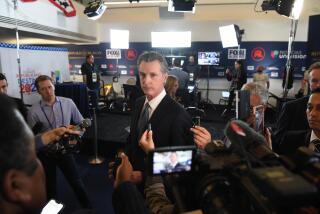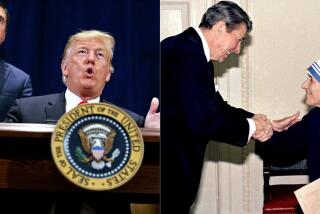Gingrich the Political Cat Stalks Future
MANCHESTER, N.H. â Newt Gingrich is like a cat with nine lives. You just never know whether heâs on his ninth life or his fourth.
Having weathered a grueling ethics investigation, a GOP plot to dump him as House speaker and a steady series of self-inflicted political wounds over the last three years, the Georgia Republican is barnstorming the country to promote his new book--and inviting speculation that he is going to run for president.
Not clear is whether he is seriously contemplating a bold entrance onto the presidential political stage, or just orchestrating a graceful exit from his extraordinary congressional career.
Gingrich says that he will leave Congress after his term as speaker ends in 2002. But he may leave sooner if he decides to seek his partyâs presidential nomination in 2000, and his House colleagues are already fighting over who will succeed him as speaker.
Gingrich says that he has made no decision. But he is dropping hints by making implausible book-promotion stops this month in New Hampshire and Iowa, two early primary states that no politician visits without âHail to the Chiefâ on the brain.
âYou can sell a lot of books in New Hampshire,â he teased at a book-signing event here, part of a two-week, 14-city tour. âA lot of people read in Des Moines too.â
It is an idea of remarkable audacity for a man who is one of the most divisive, controversial figures in American politics. That so many Republicans take the idea seriously reflects how far Gingrich has come in resurrecting his career from a series of political disasters that would have sidelined most public officials.
âWhen you are a decisive personality and represent real change, it becomes very tumultuous,â Gingrich said in an interview. âItâs very hard to explain to people who lead more orderly, incremental lives that your life is like white-water canoeing. Some days are exciting, some are terrifying. Not any of them are dull.â
GOP Field Is Wide Open in 2000
Speculation about Gingrich also speaks volumes about the state of Republican prospects in the 2000 presidential race. The field is more wide open than it has been in decades. Anybody with Gingrichâs name recognition and fund-raising advantages--and there arenât many--can indulge the dream of pursuing the presidency.
But even his admirers find it hard to imagine Gingrich actually being elected president. They see the flirtation as another step in an effort to rehabilitate his image in the twilight of his congressional career. Just having the idea floated allows Gingrich to âdevelop a graceful exit strategy and get a second look by the public,â said one GOP ally who asked not to be identified.
Gingrichâs reign as speaker could end more abruptly if Democrats win control of the House this year. Gingrich dismisses the possibility out of hand, but some Republicans grew more nervous recently when the Pew Research Center released poll results showing that, at least in the abstract, people prefer Democrats over Republicans, 52% to 40%.
âIf more polls like that come out, people are going to suggest to Newt that he worry more about the House than about his personal rehabilitation and presidential ambitions,â said William Kristol, a GOP strategist and editor of the Weekly Standard magazine.
How could one of the most unpopular politicians in America get elected president? At the nadir of his popularity--while the House Ethics Committee was investigating him and Democrats were pounding him during the 1996 campaign--Gingrichâs approval rating sank to 21%, according to Time/CNN polling.
His Private Life Could Be an Issue
Although Gingrich is now enjoying what for him is a spike in his popularity, far more people still disapprove of him than approve. And if controversy over Clintonâs private life sends Republicans looking for a nominee with an unblemished background, Gingrich may be at a disadvantage: He had a bitter divorce in the 1970s and has faced published allegations about past encounters with women.
Still, Gingrich has some rare and valuable political assets. Unmatched as a fund-raiser, he single-handedly raised $106 million for Republicans during the 1995-1996 election cycle. This ability gives Gingrich the luxury of waiting far longer before deciding whether to run for president than other potential rivals can afford.
Whatâs more, Gingrich enjoys a kind of celebrity that none of the other GOP presidential aspirants can claim. When Gingrich showed up at Barnes & Noble here to sign copies of his new book, âLessons Learned the Hard Way,â more than 200 people showed up, the bookstore estimated, and the book-signing line started to form three hours before he arrived.
âThere are few individuals I would do this for,â said Catherine Naczas, a Manchester woman who took the morning off work to stake out a position near the head of the line. âHe portrays a basic revival of values we need to get back to.â
âNewt Gingrich is the most popular candidate for Republicans to run in 2000,â said Candice Bushey, a bank manager who drove 45 minutes to get her book signed by Gingrich.
His cult-like following could make Gingrich a force in GOP primaries, but he would have a far harder time appealing to swing voters and disaffected Democrats in a general election. Hostility toward Gingrich among Democrats runs so high that, according to a spokesman for the Democratic Congressional Campaign Committee, the partyâs direct-mail receipts shoot up every time Gingrich is prominent in the news.
Gingrich has been here before. He came to New Hampshire for a campaign-style swing in 1995, when he seemed at the peak of his new powers as speaker. But that was before a two-year period in which he staggered from one controversy to the next.
He was labeled a âcrybabyâ in late 1995 for complaining about how Clinton treated him on Air Force One. He took heat when a fight with Clinton over the budget led to two government shutdowns. After a yearlong ethics investigation, he became the first speaker ever reprimanded. Conservatives became so dissatisfied with his leadership by last summer that a band of backbenchers conspired with some of Gingrichâs own lieutenants in a failed attempt to unseat him as speaker.
In his book, Gingrich culls the lessons: Keep your mouth shut. Pick your fights wisely. Learn to communicate.
Gone is the bullheaded, overweight, undisciplined Newt. Meet the humbled, slimmed-down Newt, willing to admit that he made mistakes. The full-length photograph of Gingrich on the bookâs cover tells it all. Grinning cheerfully in an autumnal setting, clad in a jaunty leather jacket and jeans, Gingrich seems to be saying: A friendly guy like me would never shut down the government.
Gingrich insists that he will not even think about running for president until Labor Day 1999. âI havenât decided yet,â he told one woman at the bookstore. âIâm having a good time being speaker.â
But he and his lieutenants are maneuvering to keep his options open.
In March, Gingrich gave a speech at a big cattle-call for potential GOP presidential candidates. He sounded out the chairman of the Iowa Republican Party about a possible job in his political machine. He is seeking a broader audience with his speeches, emphasizing such issues as the drug war, retirement security and tax cuts--important âgoals for a generation,â as Gingrich puts it, but a far cry from the impatient, hard-edged agenda he laid out for the first 100 days of Republican rule in Congress.
Some Allies Predict Disaster If He Runs
Some of his allies fear that Gingrich risks ending his political career with a failed presidential bid.
âIâve made the pitch to him: Focus your energy on keeping a majority in Congress and electing a Republican president in 2000 and spend the last two years as speaker with a Republican president and really finish the job,â said Dan Meyer, a lobbyist who for years was Gingrichâs chief of staff.
If Gingrich, 54, does not run for president, what will he do next? A lover of dinosaurs--and a former professor of history--Gingrich says that he already has talked to the Museum of Natural History in New York and other museums about future opportunities.
âI can imagine a very happy life studying natural history, studying dinosaurs, giving speeches,â he says. âThis will not sound like a typical politician, but Iâm not a typical politician.â
More to Read
Sign up for our Book Club newsletter
Get the latest news, events and more from the Los Angeles Times Book Club, and help us get L.A. reading and talking.
You may occasionally receive promotional content from the Los Angeles Times.








